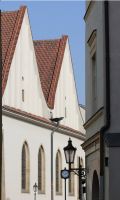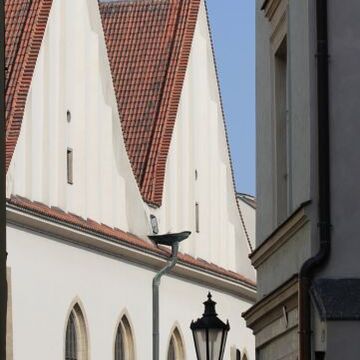Jan Hus shall unite us!
 This was said by the Roman-Catholic bishop, František Radkovský, in St. Nicholas' Church in Prague's Old Town Square on December 3, 2013. The occasion for these groundbreaking words was the signing of an agreement between the Evangelical Church of Czech Brethren (ECCB) and the Czechoslovak Hussite Church regarding the joint preparation and implementation of various activities for the anniversary of the burning of Jan Hus, which will be marked for the 600th time on July 6, 2015. It is fascinating how Jan Hus, even 600 years after his death, sets people in motion, how new starts and beginnings, which have not been expected in this way, are possible.
This was said by the Roman-Catholic bishop, František Radkovský, in St. Nicholas' Church in Prague's Old Town Square on December 3, 2013. The occasion for these groundbreaking words was the signing of an agreement between the Evangelical Church of Czech Brethren (ECCB) and the Czechoslovak Hussite Church regarding the joint preparation and implementation of various activities for the anniversary of the burning of Jan Hus, which will be marked for the 600th time on July 6, 2015. It is fascinating how Jan Hus, even 600 years after his death, sets people in motion, how new starts and beginnings, which have not been expected in this way, are possible.
Let's start with the two Churches. Those who do not know the Church scene in the Czech Republic, will find it rather normal that two Churches, both related to the Bohemian Reformation, work together towards such an important anniversary. If you look closely, you'll learn that these two Churches come from very different traditions and therefore have a different character. Common to both Churches is that they were created, in their present form, after the end of the 1st World War. The ECCB was constituted, in its present form, in December 1918, some six weeks after the creation of Czechoslovakia. At that time, the Reformed and Lutheran Czech-speaking parishes joined together, in the territory of today's Czech Republic, and gave themselves the name "Evangelical Church of Czech Brethren". That was an act of liberation! Since the Patent of Toleration, issued by Emperor Joseph II in 1781, Protestants were allowed to re-emerge from the underground, but they were not allowed to refer to the Bohemian Reformation. And now Czech Protestants were allowed to choose their own way and also their own name. This was a new start!
The Czechoslovak Hussite Church also has its beginning soon after the creation of Czechoslovakia. It was founded in January 1920 and developed out of the modernist "Away from Rome"-movement. In 1920 the Church’s founders gave the new Church the name "Czechoslovak Church" and perceived this new Church as a national Church, in which mass was now held in Czech, in which the priests were allowed to marry and also women were ordained. Since 1971 this Church has been called the "Czechoslovak Hussite Church". She has, in some theological and liturgical questions, further developed the Roman tradition. For example, there are seven Church sacraments and she sees herself as a liturgical, reformed Church.
Both Churches have gone different ways on many issues, but in some ways they also had points of tangency. And now Jan Hus brings these Churches closer to each other again. They have worked out, in the fall of 2013, an agreement in which both Churches express their will to celebrate together the 600th anniversary of the martyr death of Jan Hus.
The first joint steps led to the Prague city Hall and to the Ministry of Culture, which is, in the end, responsible for the churches in the Czech Republic. The Church's representatives found open doors at the Ministry of Culture as well as with the Mayor of Prague 1. An experience that is particularly pleasing for the Churches. Just 25 years lie between now and the time of totalitarianism, in which the Churches were, at best, tolerated, but only if they behaved quietly and unobtrusively. The relationship between the city hall and the rectory was then, in general, tense and separated by a nasty ditch. Then the "town halls" made life for the parishes generally difficult and often threw obstacles in the way of pastors. Something that has changed in these past 25 years! In many places Mayors and political representatives of all levels perceive the life and engagement of the Churches in a positive way, although there are still, to this day, all kinds of hindrances.
To these positive experiences belong unquestionably also the open doors of the town halls and ministries regarding the wish to make the commemoration of the martyrdom of Jan Hus a dignified event. It is particularly pleasing when the municipalities are interested, together with the Churches, to publicly remember the Rector of the University of Prague and Reformation preacher. Ing. Oldřich Lomecký. The Mayor of Prague 1 said, at the signing of the agreement by the ECCB and Czechoslovak Hussite Church on December 3, 2013 in the Church of St. Martin in the Wall, that the public has a great interest to commemorate Jan Hus in a dignified manner together with the Churches. Also Tomáš Hudeček, City Mayor of Prague, talking with church representatives, expressed similar feelings. He also expressed this by his acceptance of the patronage for the Hus Anniversary in Prague.
What can be said today about the events planned for the next year? Much is still on the way from idea to realization. Some plans need to undergo financial scrutiny, more still need some time. But even now we can say that the official Hus commemoration is set to begin on the eve of the big anniversary. For the anniversary itself, on 6 July 2015, many events are planned in the center of Prague, in Old Town Square, at the Fruit Market (Ovocní trh) and in a number of churches in the Old Town of Prague. Amongst the important places is certainly the church of St. Martin in the Wall, which already celebrated an important anniversary of the Bohemian Reformation this year, the renewal of the Last Supper in both kinds, which was celebrated October 1414 for the first time, after several centuries. This anniversary will be celebrated on October 12, 2014 with a festive Eucharist in Bethlehem Chapel, which will be planned and led by the Prague ECCB Presbytery and the Prague Diocese of the Czechoslovak Hussite Church. After the service a celebration is planned with many events including lectures on the subject of the Lord's Supper.
For the celebrations on 5th and 6th July 2015 many guests from the Czech Republic and abroad are expected. Amongst the guests from Germany, we expect the President of the Council of the EKD, Nikolaus Schneider, and many other guests from Germany, Europe and the worldwide ecumenical community.
Will we be able to include some topics regarding Jan Hus in a way that enables today's people to feel that it's not just about 600 year old history? It is also about us, about our faith, about the necessity to return to the Bible and to the origins of faith. Will we be able to be inspired by Jan Hus’ struggle for truth, so that we, in a time of arbitrariness and a strong tendency towards a Fun Society, can ask ourselves about what sustains us today, what gives our world and our lives a perspective today that goes beyond daily life, beyond individual interests, to a new start into a living faith?
It is our hope that Bishop Radkovský is proved right: Hus unites us! The Protestants will be united with the Hussites and with the Roman Catholic Christians, the Churches with the municipalities. All those who set about this work will also experience that this is anything but easy. There are some stumbling blocks as well as many opportunities for misunderstandings and, of course, differences of opinion. But these experiences cannot discourage us if we stay strong and patient on the way! And let us be guided by the Spirit of Christ!
Gerhard Frey-Reininghaus
